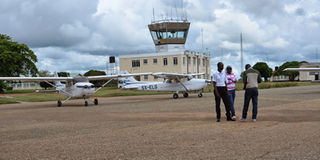Experts call for aviation staff training to meet standards

Students of Soroti Flying School at the aviation academy. FILE PHOTO
What you need to know:
For safety. They cite many inefficiencies in aviation that need to be corrected because the industry is standardised.
KAMPALA. Delegates from various countries meeting on the future of the African aviation industry have called for continuous training of aviation personnel to match the changing technological trends in the industry and the global standards set for training organisations.
The managing director of Civil Aviation Authority, Mr Rama Makuza, speaking during the opening of the second general assembly of the Association of African Aviation Training Organisations (AATO) in Kampala on Wednesday, said funding was one of the challenges facing aviation academies on the continent.
He said the conference was expected to generate meaningful debate towards the quest to enhance training opportunities for aviation experts in the region.
The conference is organised under the theme; “Aviation, training and partnerships and collaboration – challenges and opportunities”.
Mr Tchagbele Sadamba, the AATO president, said: “A special audit carried out on African aviation revealed many inefficiencies that we need to correct because aviation is a very standardised activity.”
Currently, government has one training academy, Soroti Flying School, which was started by the East African partner states in 1971. Early this year, instructors at the academy went on strike over three-month salary arrears. Some of the issues raised were lack of insurance for the aircrafts, some are grounded because of lack of fuel and others are in poor mechanical condition yet students take years to graduate and at least 13 had dropped out because of “the poor teaching conditions”.
Speaking at the conference, the Minister for Works and Transport, Ms Monica Azuba Ntege, said aviation training organisations are crucial in availing the industry the professionals it requires to thrive and grow, which is why regular consultations and interactions are necessary.
Ms Ntege said while growth in the global air traffic is necessary, it presents greater challenges and also confers increased responsibility on aviation personnel and organisations.
The minister said the government, in partnership with development partners, is working on modernising aeronautical infrastructure in the country.
“The government secured financing worth $200m (Shs665 billion) from the Exim Bank of China towards upgrade and expansion of Entebbe International Airport as part of a 20-year national civil aviation master plan,” she said.
The expansion has already commenced with works on establishment of a new cargo centre, expansion of the current terminal building and installation of a new baggage handling system.
The minister said the developments can be used effectively by a formidable and well-trained workforce and a team that can adequately deal with the challenges posed by the growing traffic and rapidly changing technology.
The challenges
Uganda has not had a national carrier since 2001 after collapse of Uganda Airlines. However, government announced that it was in the process of reviving the airline. Air Uganda, a private airline, suspended its operations over licensing issues. At a continental level, Kenya Airways and South African Airlines have also been suffering financially.



